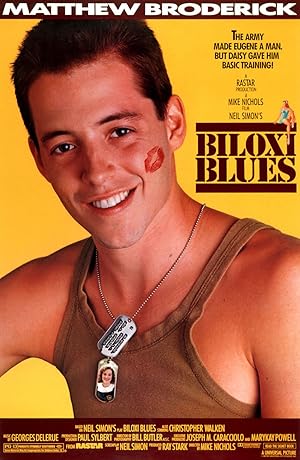
Biloxi Blues Page #2
- PG-13
- Year:
- 1988
- 106 min
- 3,046 Views
Good to see you.
Hello, soldier.
Hello.
Hi, Sergeant.
One, two, three, four!
Hmm.
One, two, three, four!
Detail, attention.
Sorry, men, perhaps I didn't
make myself clear.
Detail, ten-hut!
Good. Good.
At ease, gentleman.
My name is Toomey,
Sergeant Merwin J. Toomey,
and I'm in charge of this
platoon during your 10 weeks
of basic training here in beautiful Biloxi,
Mississippi,
after which you'll be sent to
some sh*t island in the Pacific
or some turd pile
in Northern Sicily.
In either case, returning
to your mommas and papas
with your balls intact
in highly improbable.
I speak from experience,
having served 14 months
where 73% of my comrades
are buried,
having donated a small portion
of my brains to this conflict,
the other potion
being protected
in my head.
I'd like you to answer
when your name is called.
The answer to that question
is "ho."
Not "yes," not "right,"
not "here," not "sir"...
any other unacceptable
form of reply
except
the aforementioned "ho."
Am I understood?
Peek, David P.
Ho.
Hennessey, James J.
Ho.
Wykowski, Joseph T.
Ho.
Selridge, Roy W.
Ho.
Carney, Donald J.
Ho.
Jerome, Eugene M.
Ho.
Epstein, Arnold B.
Ho, ho.
Are there two Arnold
Epstein's in this company?
No, Sergeant.
Just give me one goddamn "ho."
Yes, Sergeant.
Epstein, Arnold B.
Ho.
One more time.
Ho.
Do I make myself
clear, Epstein?
Ho.
Do I make myself
clear, Jerome?
Ho, yes.
Ho, what?
Ho, nothing.
You having trouble
understanding me, Jerome?
Ho, no.
I mean, no, ho,
Sergeant.
It's just plain ho.
Hey, Fred Astaire, are you
tryin' to tell me somethin'?
I have to go
to the bathroom, Sergeant.
How you gonna do that?
We don't have
bathrooms in the Army.
They had them in Fort Dix.
Not bathrooms, they didn't.
Yes they did.
I went in them a lot.
I'm tellin' you,
we don't have any bathrooms on this base.
You doubt my veracity?
No, Sergeant.
Then you got a problem, haven't you, Epstein?
Ho, ho.
You bet your ass,
ho, ho.
You know why
you got a problem, Epstein?
'Cause I have to go real bad?
No, son, you got a problem because
you don't know Army terminology.
goes to defecate,
relieve himself, open
his bowels, sh*t, fart, dump,
crap and unload
is called a latrine.
Latrine, from the French.
Do you want to tell us what's
funny about that, Jerome?
Well, it's just that you said all
those words in one sentence, Sergeant.
Apparently,
I don't believe
you understand the benefit
of discipline, do you, Jerome?
The benefit?
Yes, I think I do.
Then tell it to me, Jerome.
What is the benefit of discipline?
Translation
Translate and read this script in other languages:
Select another language:
- - Select -
- 简体中文 (Chinese - Simplified)
- 繁體中文 (Chinese - Traditional)
- Español (Spanish)
- Esperanto (Esperanto)
- 日本語 (Japanese)
- Português (Portuguese)
- Deutsch (German)
- العربية (Arabic)
- Français (French)
- Русский (Russian)
- ಕನ್ನಡ (Kannada)
- 한국어 (Korean)
- עברית (Hebrew)
- Gaeilge (Irish)
- Українська (Ukrainian)
- اردو (Urdu)
- Magyar (Hungarian)
- मानक हिन्दी (Hindi)
- Indonesia (Indonesian)
- Italiano (Italian)
- தமிழ் (Tamil)
- Türkçe (Turkish)
- తెలుగు (Telugu)
- ภาษาไทย (Thai)
- Tiếng Việt (Vietnamese)
- Čeština (Czech)
- Polski (Polish)
- Bahasa Indonesia (Indonesian)
- Românește (Romanian)
- Nederlands (Dutch)
- Ελληνικά (Greek)
- Latinum (Latin)
- Svenska (Swedish)
- Dansk (Danish)
- Suomi (Finnish)
- فارسی (Persian)
- ייִדיש (Yiddish)
- հայերեն (Armenian)
- Norsk (Norwegian)
- English (English)
Citation
Use the citation below to add this screenplay to your bibliography:
Style:MLAChicagoAPA
"Biloxi Blues" Scripts.com. STANDS4 LLC, 2024. Web. 26 Apr. 2024. <https://www.scripts.com/script/biloxi_blues_4105>.


Discuss this script with the community:
Report Comment
We're doing our best to make sure our content is useful, accurate and safe.
If by any chance you spot an inappropriate comment while navigating through our website please use this form to let us know, and we'll take care of it shortly.
Attachment
You need to be logged in to favorite.
Log In